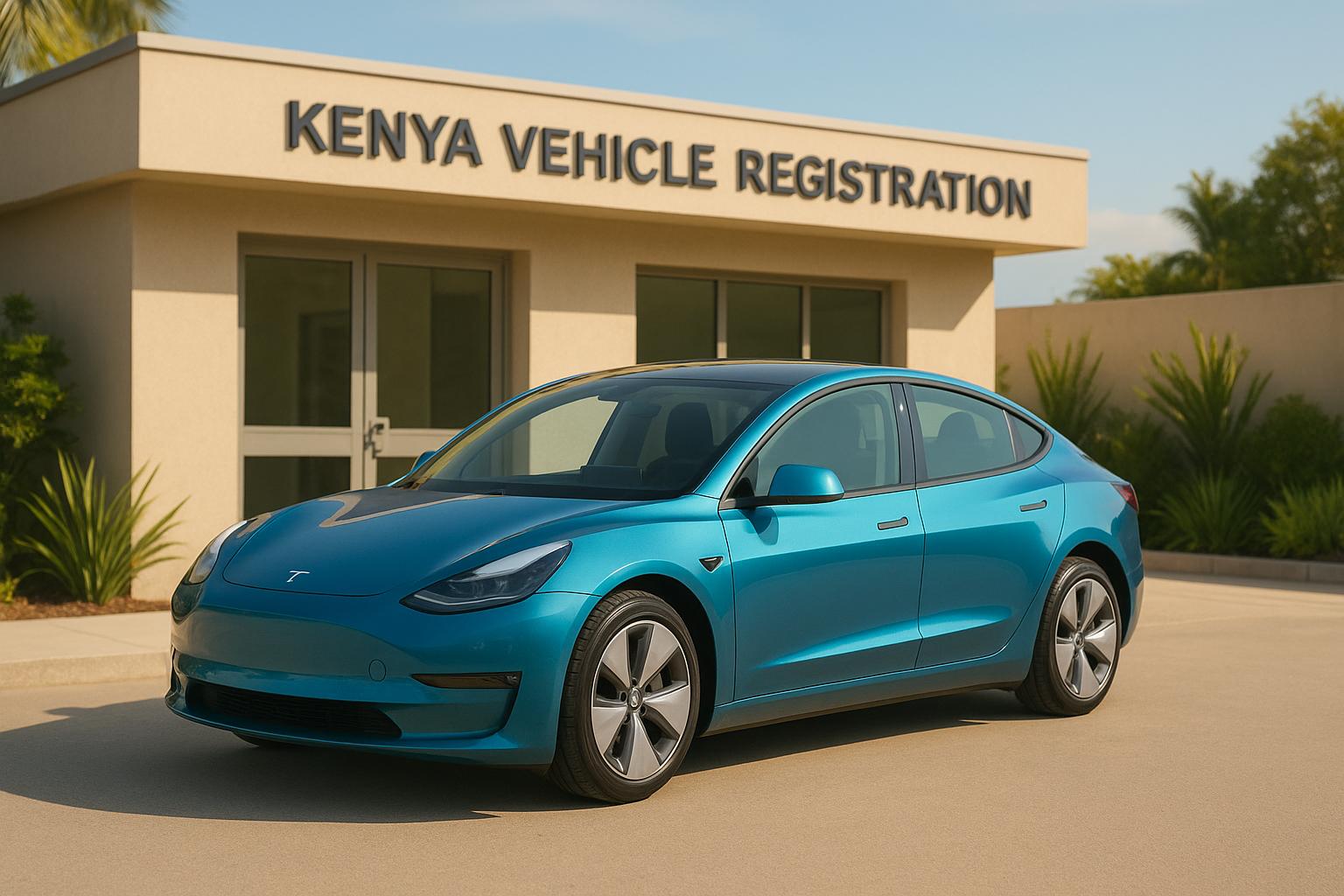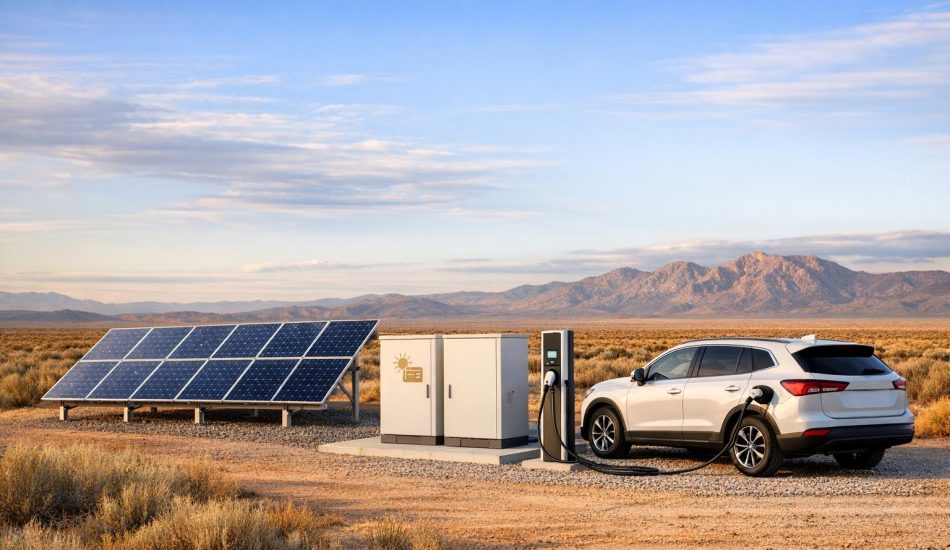
Kenya is making it easier and cheaper to own an electric vehicle (EV) as part of its efforts to reduce carbon emissions by 32% by 2030. Here’s what you need to know:
- EV Growth: Registrations surged from 2,694 in 2023 to 5,294 in 2024. By 2025, EVs are expected to account for 5% of new vehicle registrations.
- Green License Plates: Introduced in March 2024, they signify eco-friendly vehicles.
- Tax Incentives: EVs enjoy reduced import duty (10%), no excise duty, and VAT exemption, saving buyers up to 16% compared to traditional cars.
- Import Rules: EVs must be right-hand drive, under 8 years old, and retain at least 80% of their original battery capacity.
- Registration Process: Managed online via the NTSA eCitizen portal, the process takes 10–15 business days and costs between KES 10,000 and 20,000 ($75–$150).
- Post-Registration: Insurance is mandatory, and periodic inspections will be required for older EVs starting in 2025.
Kenya’s renewable energy grid (85%) makes EV adoption even more affordable, with owners saving up to 60% on fuel and maintenance costs. Platforms like EV24.africa simplify imports and compliance for buyers.
How to Apply For Motor Vehicle Registration Online in Kenya And Cost
Import Requirements for Electric Vehicles
Bringing an electric vehicle (EV) into Kenya means adhering to specific technical and regulatory standards to ensure safety and quality. The Kenya Bureau of Standards (KEBS) has set out clear rules that apply to all imported EVs, whether they’re purchased through a dealer or imported independently.
Vehicle Requirements
Kenya enforces strict rules for imported vehicles, with additional conditions for electric cars. All vehicles must be right-hand drive (RHD) to align with local traffic laws. Additionally, they must not exceed 8 years from the year of manufacture or the initial registration date.
For used EVs, there’s a specific requirement regarding battery health. Vehicles must retain at least 80% of their original battery capacity. As Esther Ngari, Managing Director of KEBS, explains:
"All used / second-hand electric motor vehicles must have battery life not less than 80% to be allowed for importation into the country."
This rule ensures that imported EVs maintain adequate performance and range, protecting buyers from vehicles with batteries that have significantly deteriorated.
Pre-Shipment Inspection and Certification
Before an EV can be shipped to Kenya, it must undergo a pre-shipment inspection under KEBS’s Pre-Export Verification of Conformity (PVoC) Standards Program. This inspection ensures the vehicle meets Kenya’s Technical Regulations and Mandatory Standards.
KEBS has appointed Quality Inspection Services Inc. Japan (QISJ) to handle inspections in key exporting countries such as Japan, the UAE, Thailand, Singapore, South Africa, and the UK. During the inspection, agents verify compliance with RHD requirements, the 8-year age limit, and the minimum 80% battery capacity. Once the vehicle passes inspection, a Certificate of Conformity (CoC) is issued. This document is crucial for customs clearance and registration.
The PVoC program also aims to safeguard public health, safety, and the environment for Kenyan consumers.
Buying EVs Through Verified Platforms
For a smoother import experience, platforms like EV24.africa offer a streamlined solution. These platforms ensure compliance with Kenyan regulations by managing the entire import process, including adherence to international commercial terms (Incoterms) and coordination with customs authorities.
EV24.africa delivers vehicles through the Port of Mombasa, handling customs clearance, registration, and import taxes. They also provide delivery across 54 African countries. By offering detailed specifications and transparent pricing, the platform helps customers make informed decisions while ensuring all regulatory requirements are professionally managed.
Registration Process Steps
Once customs clearance is completed and you have your import documents in hand, the process of vehicle registration begins. In Kenya, this is managed by the National Transport and Safety Authority (NTSA) through a digital system designed to simplify the experience.
Required Documents
To avoid unnecessary delays, make sure you have all the necessary paperwork ready before starting. You’ll need:
- Proof of ownership, such as an invoice, bill of sale, or lease agreement.
- A valid driver’s license.
- Insurance documents that meet the minimum required coverage (this is non-negotiable for vehicle registration in Kenya).
- Customs clearance documents.
- A national ID or passport.
If required, you may also need to arrange for a Vehicle Identification Number (VIN) inspection to confirm the car’s identity.
Online Registration via eCitizen Portal

Once your documents are ready, the registration process takes place online through NTSA’s eCitizen platform. In January 2024, NTSA moved its vehicle registration services to this platform as part of a broader effort to centralize government services and make the process more efficient.
To get started, visit serviceportal.ntsa.go.ke and log in to your eCitizen account. If you don’t already have an account, you’ll need to create one. Once logged in, you can access a range of NTSA services, including vehicle inspection scheduling and registration applications. Complete the online application form and upload clear, digital copies of your documents. The system will guide you through paying the registration fees electronically – don’t forget to save the payment confirmation for your records.
Timelines and Registration Stages
The registration process involves several key stages:
- Document Verification: NTSA reviews your uploaded documents for accuracy, typically within 2–3 business days.
- Vehicle Inspection: After approval, you’ll be notified to schedule a vehicle inspection. This step ensures your vehicle matches the provided documentation and meets safety standards. Inspections are usually available within 5–7 business days.
- Final Processing and Certificate Issuance: Once the inspection is complete, the final steps take an additional 3–5 business days.
Altogether, the process usually takes 10–15 business days. However, during busy periods or if additional documents are required, it may take up to 3–4 weeks. For faster documentation management, platforms like EV24.africa can help streamline certain aspects of the process.
Fees, Taxes, and Government Incentives
Kenya is making strides in promoting electric vehicles (EVs) with reduced registration fees and tax incentives designed to encourage adoption. These measures reflect the government’s commitment to cleaner transportation and a greener future.
Registration Fees and Costs
Registering an EV in Kenya comes with lower fees compared to conventional vehicles. Fees range between KES 10,000 and 20,000 (approximately $75 to $150), depending on the vehicle’s specifications. In addition, EV owners need to budget for annual insurance costs of KES 30,000 to 50,000 (around $225 to $375) and clearing agent and port charges of KES 60,000 to 80,000 (about $450 to $600) for imported vehicles.
These reduced fees align with Kenya’s ambitious goal of achieving full EV adoption by 2040. Progress is already visible – by 2024, over 7% of new motorcycle registrations in Kenya were electric.
Tax Incentives for Electric Vehicles
Kenya offers substantial tax advantages for EV buyers. Electric vehicles are subject to a 25% import duty, but they are exempt from VAT (0%) and excise duty, resulting in up to 16% savings compared to traditional vehicles.
"With the government’s commitment to promoting electric vehicles, now is the best time for Kenyan drivers to consider making the switch." – James Mwangi, AutoMag.co.ke
These incentives benefit not only individual buyers but also the broader EV market. In 2023, 2,694 new EVs were registered in Kenya, and e-mobility startups raised over $52 million in capital funding.
Cost Comparison: EV vs. Conventional Vehicles
Switching to an EV offers clear financial benefits when comparing costs side by side:
| Cost Category | Electric Vehicles | Conventional Vehicles | Savings |
|---|---|---|---|
| Import Duty | 25% | Up to 35% | 10% reduction |
| VAT | 0% (Exempt) | 16% | 16% savings |
| Excise Duty | Exempt | Standard rates apply | Full exemption |
| Fuel/Energy Costs | 60% less than petrol | Standard fuel costs | 60% savings |
Beyond the initial savings, EV owners benefit from significantly lower operational costs. On average, EV drivers save 60% on fuel and maintenance compared to those driving petrol vehicles. When combined with reduced registration fees and tax breaks, the overall cost of owning an EV is far lower.
However, proposed levies could impact these savings in the future. Staying updated on policy changes will ensure you continue to take full advantage of the incentives.
For a seamless purchase process and to make the most of these benefits, consider platforms like EV24.africa, which simplify compliance and maximize available incentives. Up next, explore the post-registration requirements to ensure your EV meets Kenya’s standards.
sbb-itb-99e19e3
After Registration Requirements
Once your electric vehicle (EV) is registered in Kenya, staying compliant with local regulations is crucial. This ensures your EV remains roadworthy and eligible for government incentives. Here’s what you need to keep in mind after registration.
Insurance and Periodic Inspections
In Kenya, insurance is a must for all registered vehicles, including EVs. Premium electric vehicles might come with higher insurance costs due to their repair expenses. To manage these costs, shop around for quotes from various providers, bundle policies where possible, and ask about discounts for safe driving or setting up automatic payments.
Periodic inspections are another key requirement. Starting in 2025, Kenya’s proposed vehicle inspection rules will make inspections mandatory for private EVs older than four years. These inspections will be conducted every two years at Computerized Vehicle Inspection (CVI) centers. For brand-new vehicles, inspections are not required for the first four years, while used imports must undergo inspection within 60 days of registration. The inspection process evaluates critical components like brakes, emissions, suspension, steering, electrical systems, and overall structural integrity. The cost for these inspections is expected to range from KES 2,000 to 4,000 (about $15 to $30).
| Vehicle Type | First Inspection Due | Inspection Frequency |
|---|---|---|
| Brand New Private Vehicles | After 4 years | Every 2 years |
| Used Imports | Within 60 days of registration | Every 2 years |
Compliance Requirements
Passing inspections is just one part of staying compliant. Regular servicing is equally important to keep your EV running smoothly and to avoid potential issues during inspections. Vehicles that emit excessive black smoke or exceed CO₂ limits may face mandatory repairs or even deregistration. All inspection processes are managed through the NTSA TIMS portal.
These compliance measures work hand-in-hand with the streamlined registration process, ensuring your EV remains safe and adheres to the required standards.
Documentation and Regulation Updates
Always keep your vehicle documentation organized and accessible, both digitally and in print. Key documents include your registration certificate, insurance policy, inspection certificates, and any import-related paperwork.
To stay ahead of regulatory changes, follow updates from the NTSA and other relevant authorities. Maintaining detailed records of your EV’s maintenance, including service histories and warranty information, can be helpful during inspections or when filing insurance claims. These records are essential for ensuring your EV continues to meet Kenya’s evolving requirements.
Conclusion
Registering your electric vehicle (EV) in Kenya isn’t just about following the law – it also opens the door to valuable government incentives. The process involves a few key steps: gathering the necessary documents, completing inspections (especially for imports), submitting your application via the eCitizen portal, and staying on top of insurance and inspection requirements.
Beyond compliance, registration comes with perks like reduced excise duties and exemptions from emissions testing. Plus, it aligns with Kenya’s ambitious plan to achieve 5% EV penetration by 2025.
The benefits don’t stop there. These policies contribute to economic growth and environmental progress. For instance, EV sales in Kenya jumped by 108% during the 2022–2023 financial year. On top of that, low electricity costs – powered by a grid that was 92% renewable as of 2020 – make EV ownership even more affordable.
FAQs
What tax incentives are available for electric vehicle buyers in Kenya, and how do they differ from those for traditional cars?
Kenya has introduced several tax incentives aimed at making electric vehicles (EVs) more appealing and affordable. These include a reduced import duty of just 10% (compared to the standard 25%), an excise duty exemption, and the elimination of the 16% VAT. Additionally, EV owners enjoy a 10-year exemption from motor vehicle tax and a 50% discount on annual road tax.
On the other hand, traditional fuel-powered vehicles come with significantly higher costs due to steeper import duties, VAT, and vehicle taxes. These measures reflect Kenya’s commitment to advancing e-mobility and encouraging more people to consider EVs as a cost-effective and environmentally friendly option.
What is the pre-shipment inspection process for importing electric vehicles into Kenya, and why is it important?
Pre-Shipment Inspection for Electric Vehicles in Kenya
Before electric vehicles (EVs) can be imported into Kenya, they must pass a pre-shipment inspection to ensure they align with the country’s safety, quality, and environmental regulations. This process is carried out by authorized agencies like KEBS or Bureau Veritas, which perform detailed physical inspections to confirm compliance.
The procedure generally includes submitting a formal inspection request along with required documents, such as the Certificate of Conformity (CoC). The vehicle is then subjected to checks for emissions, safety features, and overall condition. This crucial step helps keep non-compliant vehicles off Kenyan roads, promoting both safety and adherence to national standards.
What steps should I take after registering an electric vehicle in Kenya to meet local regulations?
After registering your electric vehicle (EV) in Kenya, there are a few important steps to follow to stay in line with local rules:
- Check the Vehicle’s Age: Your EV must be less than 8 years old from its initial registration date to meet import and registration criteria.
- License Plate Requirements: EVs must display a license plate with an ‘e’ suffix to clearly indicate they are electric.
- Roadworthiness Inspection: Every EV must undergo and pass a roadworthiness inspection, conducted by agents approved by the Kenya Bureau of Standards (KEBS).
These measures help ensure your EV meets safety and legal standards while contributing to Kenya’s shift toward cleaner, eco-friendly transportation.




